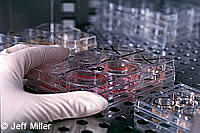Commission says more stem cell research needed to predict possible outcomes
A two day conference held on 13 and 14 September on stem cell research organised by the European Commission's Research DG has claimed that more research is needed before the full implications of this research can be predicted with confidence. The conference also concluded that clearer national regulations are needed in the area of life sciences to provide unambiguous guidelines on what is allowed and what is forbidden. EU Research Commissioner Philippe Busquin said: 'Stem cell research is among the proposed research priorities under the next framework programme for research (2002- 2006). Stem cell-based therapies hold great potential for curing diseases and injuries. I believe we can gain a lot from a stronger exchange of information and co-ordination across Europe of stem cell research. But I want to make clear that European research programmes do not and will not fund research on embryonic stem cells that involves the creation of an embryo for research purposes.' The meeting was part of a wider Research DG drive to co-ordinate European efforts in life sciences research. The Commission is currently financing 15 transnational research projects on stem cell therapy. It has channelled 27 million euro into European stem cell research projects involving more than 100 laboratories. All scientists involved in EU stem cell research work exclusively with cells taken from adults, umbilical cord blood or aborted foetuses. This is in line with a recent opinion from the European Ethics Group (EEC) which came out against the creation of embryos for research purposes. The EEC opinion also warned that therapeutic cloning techniques are still immature and present many possible risks. The Commission sees biotechnology and life sciences as fundamental to Europe's transition to a sustainable, knowledge-based economy. Europe is currently lagging behind the USA, however, in biotechnological innovation and the development of a viable biotechnology industry. The Commission is also facing strong resistance to biotechnological products from European consumers and environmentalists. It hopes to resolve those issues through dialogue between stakeholders, who will meet at a Commission-sponsored conference on 27 and 28 September. The Commission, assisted by the high level group on life sciences created by Philippe Busquin last year, will also host a stakeholders conference on stem cell research in Brussels on 18 and 19 December this year. Following on from last year's debate on genetics and the future of Europe, the conference, 'Stem cells: therapies for the future?,' aims to encourage dialogue and debate between scientists and a wide range of other interest groups.



